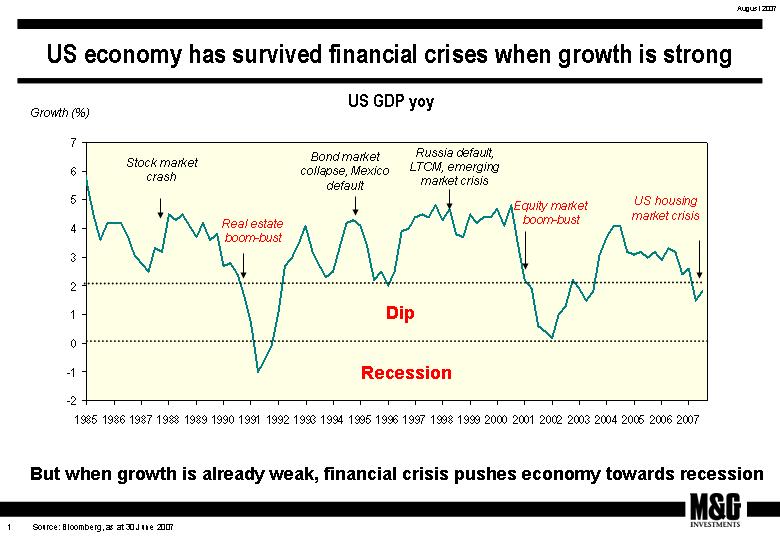Will this financial crisis send the US economy into recession?
 He certainly has a case. This chart plots US economic growth since the mid 1980s, and I have annotated the various financial crises over this period. What is striking is that when a financial crises occurs during times of rapid growth, the economy dips a little but quickly bounces back. In fact the US economy didn’t waver at all following the stock market crash of 1987, probably because US growth was booming at an annualised rate of 7.2% in Q4 1987. The financial crises of the mid-late 1990s only caused the US economy to dip briefly.
He certainly has a case. This chart plots US economic growth since the mid 1980s, and I have annotated the various financial crises over this period. What is striking is that when a financial crises occurs during times of rapid growth, the economy dips a little but quickly bounces back. In fact the US economy didn’t waver at all following the stock market crash of 1987, probably because US growth was booming at an annualised rate of 7.2% in Q4 1987. The financial crises of the mid-late 1990s only caused the US economy to dip briefly.
But a financial crisis combined with already-weak economic growth has traditionally caused a severe dip. The real estate boom of the late 1980s turned to bust, and helped contribute to a sharp recession in 1991. The equity market collapse of 2000-02 occurred when the economy was already on its knees, and only some aggressive intervention from the Fed and the US government prevented the US economy experiencing negative growth.
This time around, the US economy has already had a year of sub trend growth, and a credit crunch has come at a bad time. I think the Fed will have to act fast to prevent a slide towards recession.
The value of investments will fluctuate, which will cause prices to fall as well as rise and you may not get back the original amount you invested. Past performance is not a guide to future performance.


18 years of comment
Discover historical blogs from our extensive archive with our Blast from the past feature. View the most popular blogs posted this month - 5, 10 or 15 years ago!


Bond Vigilantes
Get Bond Vigilantes updates straight to your inbox





